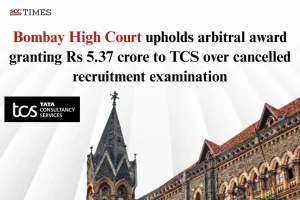Bombay High Court: In the present case, a petition was filed under Section 34 of the Arbitration and Conciliation Act, 1996 (‘1996 Act’), wherein the Uttar Pradesh Legislative Assembly (‘UPLA’) Secretariat assailed the arbitral award dated 24-11-2023, which declared termination of the agreement between UPLA Secretariat and Tata Consultancy Services Ltd. (‘TCS’), as illegal and directed payment of Rs 5.37 crore with interest and costs to TCS. A Single Judge Bench of Sandeep V. Marne, J., after noting that the tribunal had found that the examinations were successfully conducted and services were substantially complete, upheld the award in favour of TCS, and dismissed the petition as not maintainable.
On the plea of frustration of contract, the Court emphasised that Section 56 of the Contract Act, 1872 (‘Contract Act’) applies only when performance becomes impossible or unlawful, and not after obligations are fulfilled.
Background:
In 2015, the UPLA Secretariat entered into an agreement with TCS to conduct online examinations for recruitment of Review Officers and Assistant Review Officers. The services included application management, allocation, item management, online assessments, evaluation and results, with payment fixed at Rs 350 per candidate. TCS conducted the examinations for 77,804 candidates in December 2015 and raised invoices.
In June 2016, the Secretariat terminated the agreement citing anomalies in another examination conducted by TCS for the Railway Recruitment Board. TCS disputed the termination, demanded payment, and thereafter, correspondence followed. TCS invoked Arbitration in 2018, and a sole arbitrator was appointed in 2019.
By award dated November 2023, the tribunal held the termination illegal and directed the State to pay Rs 5.37 crore with interest and costs to TCS. The tribunal rejected the State’s contention that the Secretariat was distinct from the State and its plea of frustration of contract.
The State argued before the Court that the claim was wrongly filed against it and that the contract had become void under Section 56 of the Contract Act, while TCS maintained that services were complete and payment was due.
Analysis and Decision:
The Court noted that though several grounds were pleaded in the petition, essentially only three points were argued: (i) that there is no arbitration agreement with the State, (ii) that the case involves the eventuality of “impossibility” within the meaning of Section 56 of the Contract Act and therefore the agreement is rendered void, and (iii) that assuming any expenses are incurred, the claim ought to have been restricted under Section 70 of the Contract Act.
On the first issue, the Court observed that description of the petitioner as “State of Uttar Pradesh through Legislative Assembly Secretariat” was a result of amendments allowed during proceedings. The Court emphasised that Article 187 of the Constitution only provides for separate secretarial staff and does not create the Secretariat as a distinct entity from the State. It was highlighted that the meaning to be assigned to the expression “Government” depends on the context in which it is used and cannot be limited only to the Executive but would include even the Legislature. The Court held that for the purposes of enforcement of the award, the Secretariat could not be treated as separate from the State, and that hyper-technical objections about impleadment did not deserve acceptance.
On frustration of contract, the Court emphasised that the tribunal had conducted a factual enquiry into the aspect of “frustration,” holding that after successful conduct of the recruitment examination, TCS was appreciated by the office of the Principal Secretary. On this issue, the Court emphasised that the tribunal had rightly found that the examinations were successfully conducted, services under the agreement were substantially complete, and cancellation occurred only thereafter, thereby making Section 56 of the Contract Act inapplicable.
As to limitation of claim, the Court observed that since services were completed, the claim could not be restricted to quantum meruit under Section 70 of the Contract Act. It was emphasised that the defence raised was more of convenience aimed at avoiding payment under the award. The Court highlighted that the award could be upheld on merits and that there was no error going to the root of the matter warranting interference.
Ultimately, the Court held that the petition was liable to be dismissed and thus, upheld the arbitral award. Considering that the transaction between the parties was of a commercial nature, the Court noted that it would have been justified in awarding costs in favour of the TCS, however, since the tribunal had already quantified costs at Rs 11,00,842 and awarded interest at 1.5 per cent per month on the principal amount, no further costs were imposed.
[State of U.P. v. Tata Consultancy Services Ltd., 2025 SCC OnLine Bom 4744, decided on 25-11-2025]
Advocates who appeared in this case:
For the Petitioner: Abhinav Chandrachud with Pranit Kulkarni, Shailendra Singh, Kushal Choudhary & Ismail Shaikh
For the Respondent: Rohan Kelkar with Riya Pichaya i/b India Law LLP


